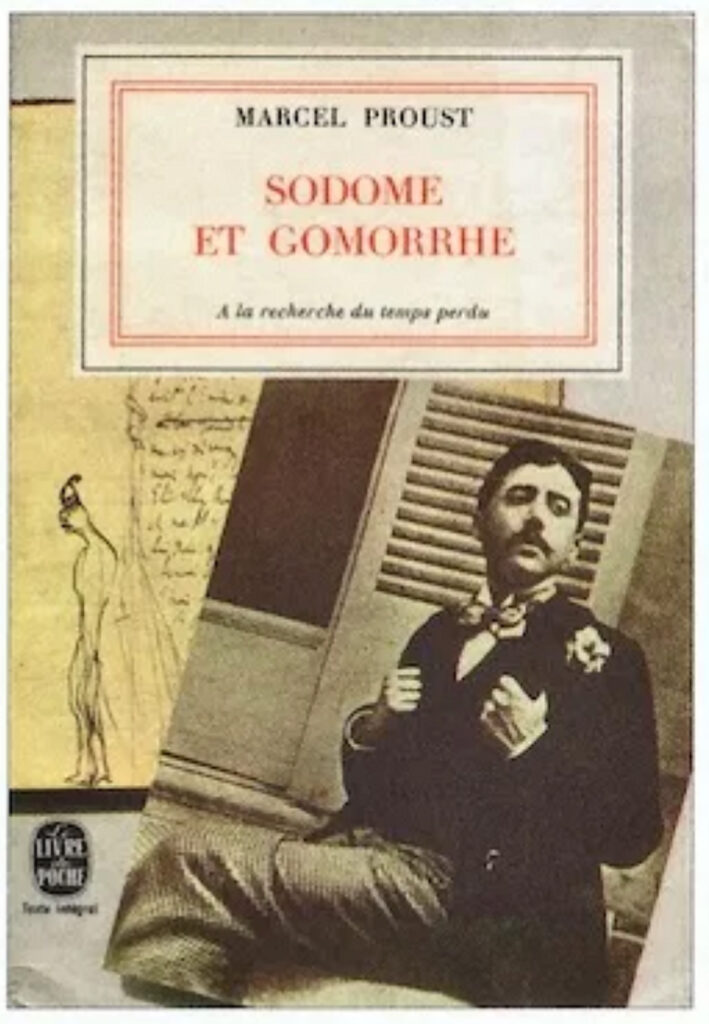
Baron de Charlus attends his first Verdurin dinner party at La Raspelière with Morel and he misinterprets Dr. Cottard’s gaze as some kind of sexual advance:
« Pour M. de Charlus, qui pensait peut-être aux dangers (bien imaginaires) que la présence de ce Cottard dont il comprenait à faux le sourire, ferait courir à Morel, un inverti qui ne lui plaisait pas n’était pas seulement une caricature de lui-même, c’était aussi un rival désigné. Un commerçant, et tenant un commerce rare, en débarquant dans la ville de province où il vient s’installer pour la vie, s’il voit que, sur la même place, juste en face, le même commerce est tenu par un concurrent, n’est pas plus déconfit qu’un Charlus allant cacher ses amours dans une région tranquille et qui, le jour de l’arrivée, aperçoit le gentilhomme du lieu, ou le coiffeur, desquels l’aspect et les manières ne lui laissent aucun doute. Le commerçant prend souvent son concurrent en haine; cette haine dégénère parfois en mélancolie, et pour peu qu’il y ait hérédité assez chargée, on a vu dans des petites villes le commerçant montrer des commencements de folie qu’on ne guérit qu’en le décidant à vendre son « fonds » et à s’expatrier. La rage de l’inverti est plus lancinante encore. Il a compris que dès la première seconde le gentilhomme et le coiffeur ont désiré son jeune compagnon. Il a beau répéter cent fois par jour à celui-ci que le coiffeur et le gentilhomme sont des bandits dont l’approche le déshonorerait, il est obligé, comme Harpagon, de veiller sur son trésor et se relève la nuit pour voir si on ne le lui prend pas. Et c’est ce qui fait sans doute, plus encore que le désir ou la commodité d’habitudes communes, et presque autant que cette expérience de soi-même qui est la seule vraie, que l’inverti dépiste l’inverti avec une rapidité et une sûreté presque infaillibles. » (Sodome et Gomorrhe II, Gallimard, 1922)
And here, the same passage in English:
« To M. de Charlus, who was thinking perhaps of the wholly imaginary dangers in which the presence of this Cottard whose smile he misinterpreted might involve Morel, an invert who did not attract him was not merely a caricature of himself but also an obvious rival. A tradesman practising an uncommon trade who on his arrival in the provincial town where he intends to settle for life discovers that in the same square, directly opposite, the same trade is being carried on by a competitor, is no more discomfited than a Charlus who goes down to a quiet country spot to make love unobserved and, on the day of his arrival, catches sight of the local squire or the barber, whose aspect and manner leave no room for doubt. The tradesman often develops a hatred for his competitor; this hatred degenerates at times into melancholy, and, if there is the slightest suggestion of tainted heredity, one has seen in small towns the tradesman begin to show signs of insanity which is cured only by his being persuaded to “sell up” and move elsewhere. The invert’s rage is even more obsessive. He has realised that from the very first instant the squire and the barber have coveted his young companion. Even though he repeats to him a hundred times a day that the barber and the squire are scoundrels whose company would bring disgrace on him, he is obliged, like Harpagon, to watch over his treasure, and gets up in the night to make sure that it is not being stolen. And it is this, no doubt, even more than desire, or the convenience of habits shared in common, and almost as much as that experience of oneself which is the only true experience, that makes one invert detect another with a rapidity and certainty that are almost infallible. » (Sodom and Gomorrah, translated by C.K. Scott Moncrief and Terence Kilmartin, revised by D.J. Enright. The Modern Library, 1993)
